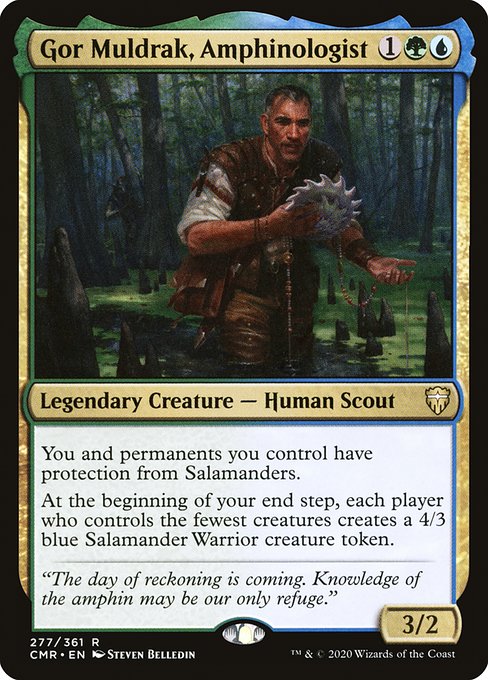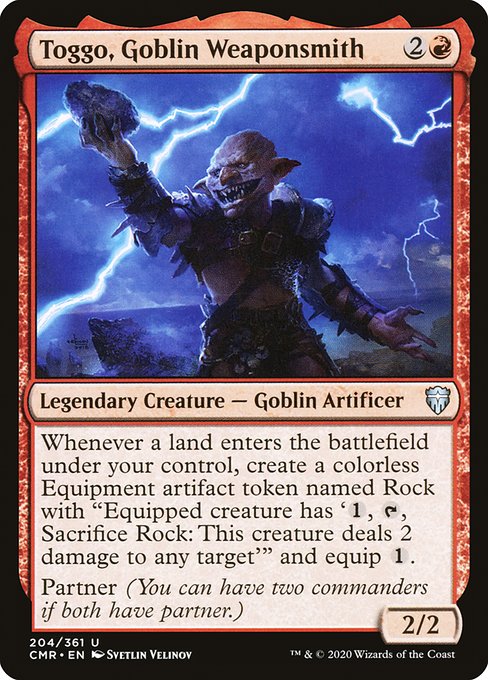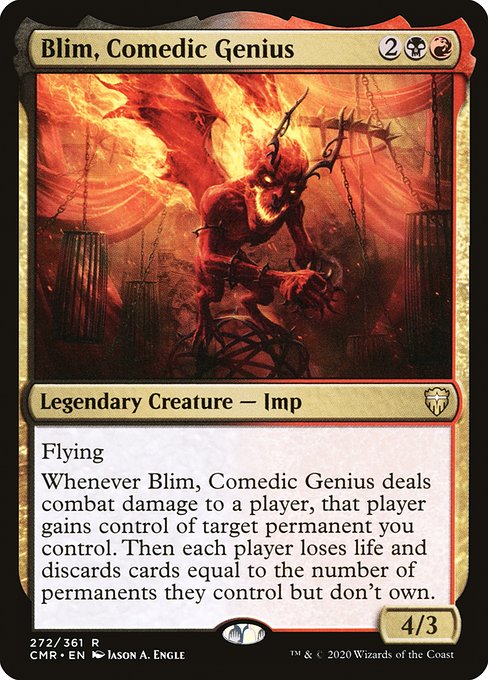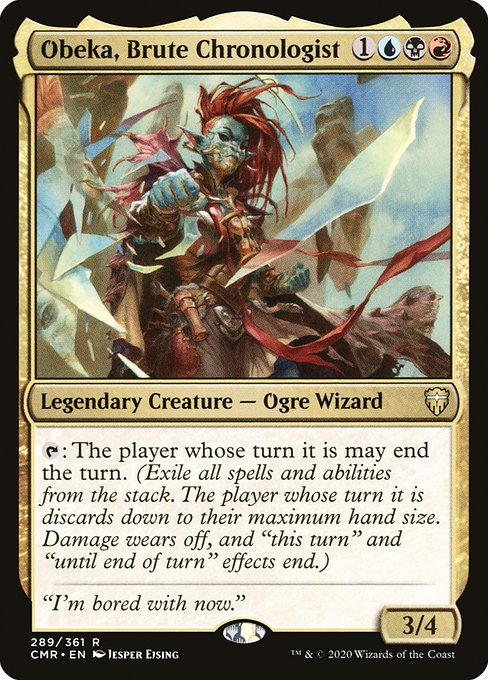The topic of humor comes up too rarely in the course of my Magic writing. Has it really been three years since I mused about the potential of Unstable? Despite what you might deduce from regular perusal of my column, I think about the meta-mechanics of jokes a lot. The only thing I like more than cracking jokes is wrecking them. But the ugly truth of comedy writing is that only a portion of it is actually writing; the rest is consumption and analysis and discussion of intent, target, and methodology. That’s true for any form of writing, but comedy requires research and ratiocination into not just how the art form works, but what it’s trying to achieve in the first place.
I use comedy to process anxiety—as a consumer, that means I default to British cringe comedy and experimental social comedy like Nathan for You as comfort food. Societally, I’m often in a position of power; I deal with the public from a place of mild authority occupationally, and I present as a privileged person (male, bulky, bearded, stentorian, etc.) socially. It takes time for people to realize that I’m actually a salmagundi of neuroses and Catholic guilt. In comedy, I make myself powerless, because that juxtaposition is inherently comedic—I often play the pompous oaf or the cringing nebbish to create the dissonance that comedy demands. That dissonance is hard to pull off in Magic, as it requires a rigid system to function against; dissonance is “the game breaking down” rather than “social mores breaking down” except we don’t want the game to break down. (Unless it’s an infinite loop of Oblivion Ring triggers.)
It’s hard for Magic to be naturally funny. Since we see the same cards game after game, any initial jokes become tiresome through repetition. It’s also hard to pitch jokes to your audience, because Magic has so many different audiences: Limited players, Constructed players, flavor aficionados, those who ignore flavor text entirely, non-Anglophones, literal children, me after four beers, engineering majors—writing jokes into Magic is like doing an improv set in Hell. Humor has had its place in Magic, certainly—that was Head Designer Mark Rosewater’s original career, after all—but the punchlines don’t always land (e.g., Gorilla Titan).
All of this is to say: I’m impressed by Commander Legends, which is secretly a comedy set. Maybe my brain is broken this late in 2020—again, I hasten to remind you that I process negative emotion through dubiously tasteful comedy—but several cards elicited actual LOLs from your humble narrator. The jokes of Commander Legends are not the slapstick of Unstable or the quippy flavor text of pre-Kamigawa Magic, but a more emergent style of comedy. The humor comes from the interactions between the cards and between the players, rather than any integral comedy in the set. That means it more resembles traditional comedy: a playground to break rules without consequences.

All sorts of humor found its way into the set—starting with Breeches, Brazen Plunderer and his whole joyous crew of Pirates, but taken to another level of surprise with the Amphin. Gor Muldrak, Amphinologist finally gives us what we’ve been pleading for all these years: protection from salamanders. And then there’s the grim hilarity of Hullbreacher, who makes Smothering Tithe look like Mystic Remora.
Mana Drain is back and still proving itself to be Magic’s alt-comedy card. Perfectly frustrating, it halts the game temporarily, and it can shift the power dynamic of a game completely. It used to be much funnier in the days of mana burn; it was entirely possible to burn yourself out of a game countering a Fireblast. Damned if you do, damned if you don’t, and laughing to the gallows.

Toggo, Goblin Weaponsmith is made into a brilliant joke by the rules of Magic. Since 2007’s Lorwyn, creatures default to “Race + Class” as their creature types. Toggo could have easily been a Warrior or a Shaman; but no, he’s an Artificer, clarifying that he isn’t lucky, but skilled. This is the best Goblins have to offer in terms of warcraft, and they’re lucky to have Toggo. The entire story the card tells is humorous—even though I hate how poorly it interacts with Aggressive Mining—definitely a flavor failure there—but that single word elevates the comedy.
Nadier’s Nightblade tells a different joke, one that creeps up on you: unlike Toggo, it’s missing a word that makes it comedy. Without “creature,” as in “token creature,” the synergy isn’t just with Elf tokens, but with Treasures and Clues. If you’re an enfranchised player, you may have automatically read “creature token” instead of “token,” whereas newer players catch on immediately. That’s a Steamflogger Boss joke, making your assumptions the subject of the gag.
Apex Devastator is maximalist comedy! This is Jackass. It is subtle? No. Is it sophisticated? More than you’d think! Does it surprise you with how funny it is each time you see it? Absolutely. This is broad comedy, but the thing about broad comedy is that it hits hard. Wrong Turn is similarly broad, but also much more nuanced—do you hand off an Eldrazi that’s attacking you to an opponent? Or do you give away a creature with a serious drawback? Speaking of which:

Blim, Comedic Genius is a pretty straightforward card on first glance—donate cards with serious drawbacks to your opponents and watch the fun. Demonic Pact, new arrival Demonic Lore, Aggressive Mining, Bronze Bombshell, various Liches—these are amusing jokes, but they’re obvious. They’re the lowest-hanging of fruit, the “y’all use Tinder?” open-mic fodder, the gags that were fresh back when Zedruu was doing them.
A much funnier use for Blim, to me, is as a chaotic holiday sprite who gives you exactly what you want at exactly the wrong time—a “Gift of the Magi” gremlin who passes out Ghirapur Orrery and Storm Cauldron to your opponents. The humor of Zedruu has long been squeezed out by EDHREC optimizations and consensus picks, so why not start over with a fresh face? Blim is also best friends with Tinybones, Trinket Thief—if you wanted to quietly Sharpie “partner” on both of their sleeves, I wouldn’t push back.

I’m also especially taken with Obeka, Brute Chronologist. Sure, it’s funny (the first few times) to end the turn before your Final Fortune takes you out, but it’s much funnier to discard to untap Obeka with Mind Over Matter or Freed from the Real four times during an opponent’s turn. “Would you like to end the turn?” “What? No.” “How about now?” “Still no.” “Okay.” “Move to combat.” “In response: would you like to end the turn?” “NO.” That’s vaudeville.
I expected a whole host of new Legends from Commander Legends, but I didn’t expect it to split the difference between Standard set and Un-set. I certainly didn’t expect to see a card with “You and permanents you control have protection from Salamanders.” But that’s the joy of comedy—it’s meant to shock you into a response, to surprise you with an unexpected connection. It’s a moving target that hits different for everyone; but in this chaotic year, I am thankful for the laughter mixed into this exciting new set.
A lifelong resident of the Carolinas and a graduate of the University of North Carolina, Rob has played Magic since he picked a Darkling Stalker up off the soccer field at summer camp. He works for nonprofits as an educational strategies developer and, in his off-hours, enjoys writing fiction, playing games, and exploring new beers.

